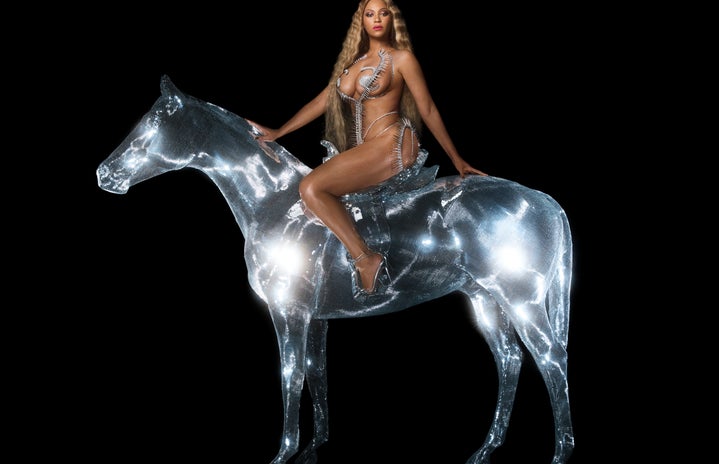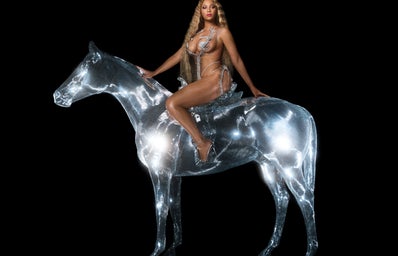The Grammy Awards are not worth any hype or attention.
The year is 2014. Drake’s “Nothing Was The Same,” Jay-Z’s “Magna Carta…Holy Grail,” Kanye West’s “Yeezus,” and the coveted Kendrick Lamar’s “Good Kid, m.A.A.d City” are competing for the Rap Album of the Year award at the 56th Annual Grammy Awards. The winner? With much shock and dismay, Macklemore and Ryan Lewis’ “The Heist” took home the award.
The 65th Annual Grammy Awards happened on February 5, 2023. After watching, it is important for music listeners to take a step back to recognize the faults in what is claimed to be “music’s biggest night.” As someone who cares about music and has read extensively about pop culture events and music awards, I have found that the Grammy Awards do not deserve such high prestige within the music industry.
The Music
Whether you listen to Lizzo or Mozart, there is no denying that the music industry is incredibly diverse. On “music’s biggest night,” one would expect many different genres and demographics of music to be represented. That said, every year, the list of categories and winners favors predominately white music genres and artists.
Categories
The Grammy Awards include very specific categories that contain a large spectrum of different genres such as Best Bluegrass Album and Best Musica Urbana Album. Despite such diversity, the Grammys still give fewer opportunities for non-white musicians to win. In 2021, Ian Brennan, a Grammy-winning music producer for overlooked regions and groups, reflected how the “Global Music category is the only category in which 89.2% of the Earth’s population—non-English and non-Spanish speakers—have even a remote chance of receiving any recognition from the Academy.”
Nominations
Furthermore, the Recording Academy also prefers to nominate male over female artists in many categories. The USC Annenberg Inclusion Initiative found that 86.6% of Grammy nominees from 2013-2021 were male. This year alone, between both categories of Best Rap Song and Best Rap Album, no women were nominated. In the year 2022, there were plenty of female rap releases that deserved to be recognized in those categories, such as the album “Traumazine” by Megan Thee Stallion or songs like “Conceited” by Flo Millie. Even artists like Tyler, the Creator have called out the Grammys’ skewed nominations lists wherein many times pop music released by Black artists like himself gets nominated in the rap or R&B fields.
Winners
One of the greatest criticisms of the Grammys is that artists have consistently won in categories that they did not deserve simply because they were white, or men, or both. In 2015, the Album of the Year award was given to Beck’s “Morning Phrase” over Beyoncé’s visual self-titled album. In 2021, Billie Eilish’s “everything i wanted” won record of the year over Megan Thee Stallion’s record-breaking “Savage (Remix),” despite Eilish saying that “Savage (Remix)” deserved to win. Although Beyoncé has been dubbed “the most Grammy-awarded artist in history,” she has only ever won one of her 18 nominations in the Grammys’ “big four” categories (Record of the Year, Album of the Year, Song of the Year and Best New Artist of the Year).
The System
The Grammys are infamous for their secretive voting process which, on their website, they only describe by saying that members of the Recording Academy submit works they “consider worthy of recognition.” Members are directed to vote in their areas or genres of expertise, with the ability to vote in a maximum of 10 categories across three genres, as well as the “big four.” An independent accounting firm collects and tabulates the votes. While the Recording Academy argues that their nominating committees award quality work, rather than what is simply trending or popular at the time, and keep the organization’s integrity, I argue that the committees’ purposes are only idealistic, and instead, the truth is more complicated.
The Recording Academy actively depends on popular and trending artists and the loyalty of their fans to pull audiences into The Grammy Awards broadcast. While fans of these popular artists stream the broadcast, increasing ratings and views, the awards, especially within the “big four,” are given away to very unsuspecting artists. This causes major upsets, like in 2014 when Kendrick Lamar’s “Good kid, m.A.A.d. city” was the obvious fan and critic favorite for the Best Rap Album. But as previously mentioned, the award was given to Macklemore and Ryan Lewis’ “In the Heist.” Or similarly this year, when “Just like That” by Bonnie Raitt won the “big four” award for Song of the Year in an overwhelming surprise to viewers who were expecting the award to be given to songs such as Steve Lacy’s smash-hit “Bad Habit” or Beyoncè’s “Break My Soul.” The bias exhibited by the committees proves the Grammys’ long-time corruption that Deborah Dugan, former CEO of the Recording Academy, would later step out to accuse the Academy of practicing. Dugan also claimed that these committees were often made up of older, white males, further proving the lack of diversity and fairness within the Grammys as she mentioned instances wherein “one artist who was up for Song of the Year category was allowed to sit on the committee for that category and was also represented by a board member.”
The Voters
The Grammys ruled after the 2022 awards that they would change parts of their process, adding limits to the categories and fields members may vote on, as well as screening members through a qualification process to ensure the “voting body is actively engaged in music creation.”
The recently released article in which anonymous voters explained their voting process for the show on February 5 argues otherwise. These voters, who would have presumably gone through the Grammys’ new qualification process, made statements I found to be very ill-opinionated. One example was a voter who seemingly implied that BTS only had 12-year-old fans, therefore giving the group no reason to be featured on Coldplay’s album, deeming it “atrocious.” While the voter was incorrect about the age of BTS’s fans, it is incredibly irresponsible to decide that Coldplay’s album is “atrocious” because the featured artist’s fans are “too young.” These artists should vote on the quality of the music without considering a featured artist’s fan base demographic. This voter was not the only example who had complete disregard for the objectivity required to properly do the job. Another voter even stated, “I love Beyoncé’s album, and have been a fan of Adele, but I feel that they have already won a lot of Grammys.” Again, the premise of winning the Grammy should be based on the quality of the song. While there is immense subjectivity to what “quality” is, the amount of previous awards an artist has won should not be considered in this decision. Even more shocking was one voter who legitimately stated,
“It’s a lot of work to listen to all of [the nominated songs]. I guess I’m a bad voter because I didn’t do my diligence. But that’s my right…”
And as if it could not get any worse, they also added:
“I hold Harry Styles’ origin story against him. He’s from a boy band, and I never took those acts seriously.”
Whatever the “qualification” process was for the Grammys, it clearly did not change the voters’ deliberate choices to vote with immense bias.
The Scammys
Overall, the Recording Academy has proven time and time again that it does not pick winners based on merit or quality of music. Instead, it employs heavy favoritism, bias, and ignorance when voting, causing incredible artists and songs to be constantly overlooked. It is time for musicians and pop culture fans to stop associating the Grammys with great prestige and instead view them for what they really are: a corrupt system not worth anyone’s pride or joy.


